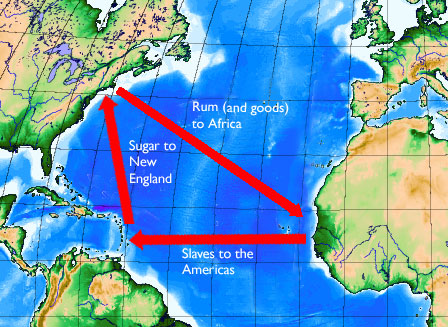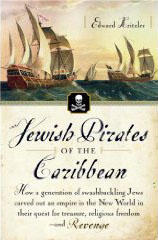Hebrews Of the Caribbean
January 17, 2013
Left, Jewish pirate Jean Lafitte helped Andrew Jackson win the Battle of New Orleans.
Long before Wall Street, Jews were prominent in the field of piracy. Richard Sinai reminisces about his home town of New Orleans, "anti-Semitism" and its connection to Jewish piracy.
by R. Sinai
(henrymakow.com)
As a child growing up in New Orleans, I was always aware of that our city had a unique, colorful, and violent past. Before New Orleans was an American city, it flew under French,Spanish , and in 1802 the Louisiana Purchase took place. I loved listening to stories of what life was like before television,radios, and the internet. My mother and father were the children of first generation Russian Jewish immigrants.
My Grandmother said that the family had left for America because of the pogroms. I hadn't yet understood why the Jews were always being harassed. It was in grade school when I first heard the word "Jew" used as a verb, and then came the crushing "Christ-killer".
I wondered why this was. I knew I was different from the other kids, I was a "kike". I spoke to other Jews and they explained that "Jews" were hated because we were known as the Chosen People and that people were jealous, because Jews were smarter than other ethnicity. I didn't believe it. After all- every other Religion or cult claims to be favored by God. I've known a lot of Jews and some of them did not strike me as 'intelligent'. These excuses made no sense to me, so I began to search out the truth.
JEWS PURGED FROM SPAIN
In 1492 , when Jews were expelled from Spain, many decided to cross the border into Portugal. After 5 years Portugal also decided to expel its Jews.
Trade routes with the Caribbean were beginning to flourish, Many Jews got involved in the thriving trade with the Caribbean Others chose to remain behind in Europe, where they migrated to Holland.
When Christoper Columbus made his first voyage to the New World, he was purported to have 5 Jews on the manifest:
・ Marco surgeon
・ Bernal, physician;
・ Alonzo de la Calle, bursar
・ Gabriel Sanchez the Treasurer of Aragon ・ Luis de Torres, the ship interpreter
Torres was the first man ashore, the first to discover the use of tobacco. Eventually he moved to Cuba and is the father of the Jewish-controlled tobacco business as it exists today.
THE TRIANGULAR TRADE
Aaron Lopez, a Jewish merchant, and shipowner, was one of the wealthiest men in the new nation of America.

His ships sailed from Rhode Island to Curacao, Barbados, and Surinam in the Caribbean. These Jewish merchants operated a 'triangular trade'.
Slaves were taken from Africa to the West Indies and were traded for molasses. The molasses was shipped to the Colonies (Newport, Charleston, Savannah) and converted to rum. The rum and manufactured goods were shipped back to Africa.
In Surinam alone, there were nearly 100 Jewish families by 1700 .They owned more than 40 estates and 9,000 slaves. By 1730, Jews owned 115 plantations and dominated the sugar export business which sent out 21,680,000 pounds of sugar to European and New World markets annually.
OY VAY! PIRATES
The most infamous and feared Jewish pirate predated the Caribbean and plundered the BarbaryCoast (North Africa.) He was Sinan "the Great Jew,"(d. 1546) Redbeard's second in command. Sinan was such a skilled navigator that he was believed to be a practitioner of the Black Arts. He successfully led 6,000 troops against the Spanish fortress at Tripoli, Libya. He "put the garrison --all save a few -- in chains, and carried them off to grace his triumph."

Another lesser known, but nonetheless daring pirate, was Moses Cohen Henriques. In 1628, Henriques joined forces with Admiral Piet Hein who was with the Dutch West Indies Co. The duo was able to pull off a gold and silver heist from the Spanish Navy. Emboldened by the raid, Henriques and Hein continued raiding Spanish ships off the Cuban coast. They successfully relieved the Spaniards of the Gold and Silver that was bound for the New World.
A short time after, Henriques led a Jewish contingent to Brazil where he established his own pirate island. Moses also became an advisor to Henry Morgan, arguably one of the most famous pirates of all time. Moses Henriques managed to evade capture throughout his exploits and was never held to answer for his crimes.
JEAN LAFITTE
Jean Lafitte's family name was was Lefitto. The Lefitto family lived in the Iberian Peninsula for generations. Jean and brother Pierre were born in Port-Au-Prince, Saint Domingue and raised by their Sephardic Jewish grandmother.
During the Napoleonic period, Lafitte relocated to French Santo Domingo until a slave rebellion forced him to flee to New Orleans.
Jean and his brother Pierre sailed the Gulf of Mexico and learned to navigate the maze of waterways just below the city of New Orleans. Eventually, he became a pirate, but he always called himself a privateer because that label has a more legal ring to it.
He carried a letter from Cartagena, (known today as Colombia) authorizing Lafitte and his buccaneers (known as the Baratarians because of the area where they operated) to capture Spanish ships and take any goods and slaves on board. However, the "Cartagena Letter" was not recognized by the United States, and Lafitte and his 1,000 followers were not welcome in the United States.
In 1815, Lafitte warned the American forces that the British would attack from the Gulf of Mexico. He knew this because he had been approached by the British first.Andrew Jackson accepted Lafitte's help.
Despite overwhelming manpower on the British side, the ragtag irregular army of General Jackson was victorious. General Jackson saw that Lafitte was pardoned for his acts of piracy, and made his family U.S. Citizens. For all of his heroics or villainy, he is revered to this day as an American hero.






